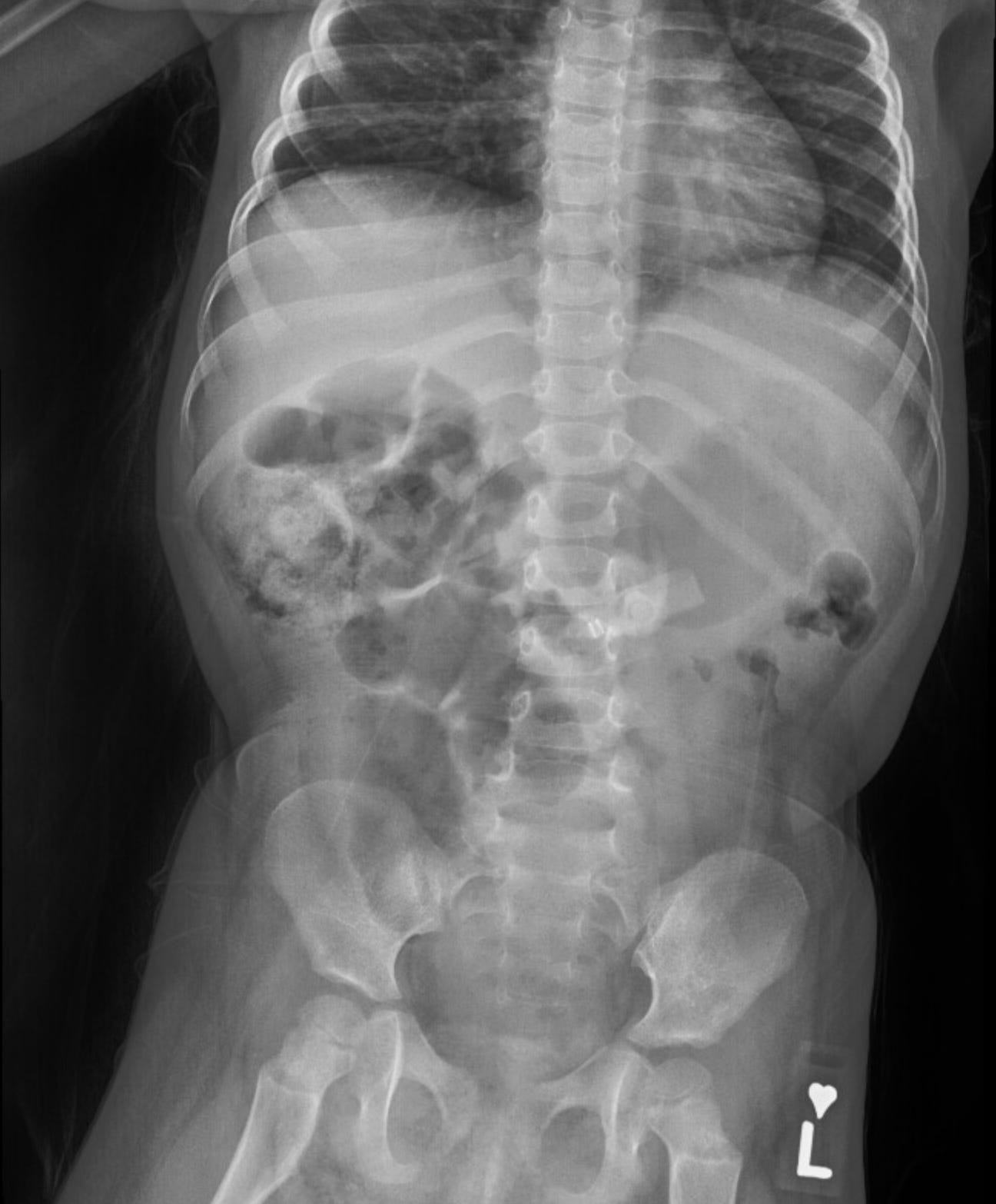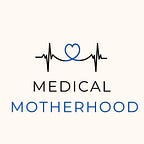
Each week, we showcase a picture of real life from the Medical Motherhood community. If you’d like to participate, simply reply to this email. The intent is to show YOUR experience as a medical parent. What do you want people to know about the #medicalmom life?
I’m running low on submissions, so if you send a picture it just might get featured! Remember: no kids’ faces. Focus on their equipment, your hands doing procedures or even your face!
Medical Motherhood’s news round up
Snippets of news and opinion from outlets around the world. Click the links for the full story.
• From CBS News: “Nearly 1 in 10 U.S. children have been diagnosed with a developmental disability, CDC reports”
The share of American children who have ever been diagnosed with a developmental disability increased again in 2021, according to a new report from the Centers for Disease Control and Prevention, and now more than 1 in 10 boys have had an intellectual disability, autism spectrum disorder or another developmental delay.
Among kids ages 3 to 17 years old, 8.56% have ever been diagnosed with any developmental disability as of 2021, according to the latest results from the agency's ongoing National Health Interview Survey.
"We're interested in understanding the prevalence of these conditions in the population so that we can make sure we have adequate services available for families and children who need them," said Benjamin Zablotsky, a statistician for the CDC's National Center for Health Statistics and lead author of the new report.
[…]From 2019 to 2021, rates of intellectual disability or autism spectrum disorder did not increase by a statistically significant amount. The report found 1.65% of children had an intellectual disability and 3.05% had autism.
The only category that increased significantly was parents reporting having been told their child had an "other developmental delay" — a grouping that can include a range of other issues, like cerebral palsy or struggles forming words. That group increased from 5.08% of kids in 2019 to 6.06% in 2021.
"A lot of times developmental delays might be temporary diagnoses that evolve into something like autism, potentially, or intellectual disability. But also a lot of times children do age out of those," said Zablotsky.
Previous questions focusing on the specific prevalence of some less common conditions, like cerebral palsy, have been dropped from the survey effort.
"When we are deciding what questions to include in the survey, if you don't get enough of a sample back, meaning the prevalence is pretty low, you can't then look at any estimates in subgroups because they're unreliable, and our center does not want to release estimates we can't stand behind," said Zablotsky.
Rates of developmental disabilities remained significantly lower in girls, at 5.31%, compared to boys, at 10.76%.
Asian children were least likely to be diagnosed with any developmental disability, at 4.85% of kids in this group. There were no significant differences between Hispanic, Black and White children. […]
• From The Washington Post: “Florida kept disabled kids in institutions. A judge is sending them home.”
[…]In his decision, United States District Court Judge Donald M. Middlebrooks called the difficulties faced by children and parents “heart wrenching,” and wrote that “any family who wants to care for their child at home should be able to do so.”
Children with disabilities typically are eligible for Medicaid services, which can be provided in a home setting or an institution. The state makes decisions about who qualifies and is responsible for paying for the services.
The cost of home health care can be cheaper than institutionalized care, but Florida has increased funding for nursing facility services while reducing funding for home- and community-based services, court documents show.
“The tragedy is that the State of Florida has programs and dedicated resources that could help these families,” Middlebrooks wrote.
The ruling, prompted by a lawsuit filed by the Department of Justice in 2013, could have sweeping implications for thousands of people across the country who need these Medicaid services to live in their homes or communities, a group that includes adults with disabilities and older people, along with disabled children and their families.
Florida is just one of many states across the country where experts say children with disabilities are being unnecessarily institutionalized rather than supported in home settings. Recently, the department has said other states, including Alaska, Maine and Nevada, also are violating the ADA in this way. […]
“In many respects, this ruling is groundbreaking,” said Kristen Clarke, the assistant attorney general for the Civil Rights Division at the U.S. Department of Justice. “Our hope is that this ruling will stand as a model for other states across the country and make clear and explain their obligations under the law.”
[…Father of one of the institutionalized children Conlan] Armour said it wasn’t until he became a witness in the lawsuit that the nursing facility finally gave him training and approved Cayden to go home. In June, Cayden started living with his father, Newton and his 18-month old sister Devi in Miramar, Fla.
Since getting home, he has become more active and is smiling and attempting to talk more, Armour said. His father hopes that this ruling will help other families.
“Whether it’s my child or somebody else’s child, we want change,” Armour said.
[Disability advocates…] believe the ruling could pressure other states to invest more in home and community based services provided through Medicaid. In 2021, 656,000 people around the country were on waiting lists to simply determine whether they qualify for these services. But even after getting approved, many people say they still can’t get this type of at-home nursing care.
[…]Eve Harris, 57, of Plantation, said she was forced to institutionalize her 16-year old grandson, Jeffery Herrion, for whom she is the legal guardian, because home caregivers increasingly didn’t show up during the pandemic. Herrion, who is blind, has cerebral palsy and other complex medical issues requiring him to use a ventilator, wheelchair and feeding pump.
“On paper, we had nursing because it was approved, but we didn’t really have nursing because nobody came,” Harris said.
While living in three different institutions Jeffery suffered from deep bed sores, smelled like urine and feces, and was hospitalized for septic shock after developing a severe skin infection. When he was admitted, Jeffery was taking five medications and breathing on his own. When he finally returned home in April, he required 18 medications and was ventilator dependent, according to both Harris and the judge’s ruling.
Harris still can’t get reliable nursing care, so she left her job and recently quit nursing school to care for Jeffery. She hopes the ruling will help her keep him home.
“He deserves that right, to be with his family members,” she said. “He deserves the right to be loved.”
• From YES! Magazine (opinion): “Children With Complex Medical Needs Belong at Home”
Children belong at home with their families. For children with complex medical needs, this is still true.
I know, because my son was institutionalized in a pediatric subacute facility for most of the first year of his life.
[…]Institutionalization is orders of magnitude more expensive than home care and developmentally harmful for children. It also disrupts the lives of parents and siblings.
[…]In order to bring our son home from the subacute, my husband and I had to demonstrate competence in the medical parts of his care. That part was difficult by any objective measure, but was easy compared to the second requirement. The facility also required us to find home nursing coverage — their initial requirement was that we have 16 hours a day of coverage, including overnight coverage, seven days a week. That requirement was insurmountable, but I spun my wheels for months trying to meet their demand. To bring him home it was my job to find home nurses, a supplier for his breathing machines, a pharmacy that could fill compounded and specialty prescriptions, and figure out all of his insurance and Medi-Cal paperwork. Institutional care provided all those things automatically, home care required me to be the ringmaster of the whole circus.
[…]I can still hear the doctor’s stern intonation when she told us, “You can never fall asleep.” She was solving the problem that she perceived — kids die when their parents fall asleep. But the solution she was providing put the blame and responsibility on the people with the least amount of power in the situation. The assumption was that the system of home care wasn’t going to be functional, and the solution was for parents to simply never sleep.
[…]Spending time in acute care hospitals may be unavoidable for these children when they receive treatments that can’t happen anywhere else. But in many situations, we could do more to allow these children to stay at home, instead of being forced to live in institutions that provide medical care. Our children and families deserve better.
Medical Motherhood brings you quality news and information each Sunday for raising disabled and neurodivergent children. Get it delivered to your inbox each week or give a gift subscription. Subscriptions are free, with optional tiers of support. Thank you to our paid subscribers!
Follow Medical Motherhood on Facebook, Twitter, TikTok, Instagram or Pinterest. The podcast is also available in your feeds on Spotify and Apple Podcasts. Visit the Medical Motherhood merchandise store.












